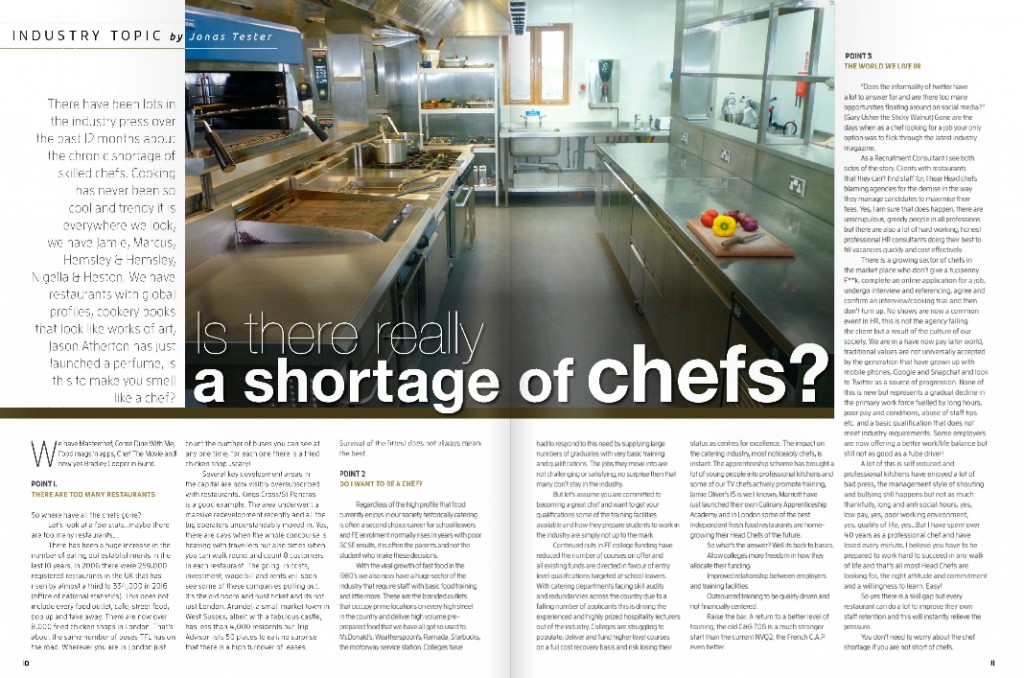The Chef Foundation was delighted to be asked to contribute to the latest edition of Chef Magazine with an article about the Chef Shortage. 
Is there really a shortage of chefs?
There have been lots in the industry press over the past 12 months about the chronic shortage of skilled chefs. Cooking has never been so cool and trendy it is everywhere we look, we have Jamie, Marcus, Hemsley & Hemsley, Nigella & Heston. We have restaurants with global profiles, cookery books that look like works of art, Jason Atherton has just launched a perfume, is this to make you smell like a chef? We have Masterchef, Come Dine With Me, Food mags ’n apps, Chef The Movie and now yes Bradley Cooper in Burnt. So where have all the chefs gone?
Let’s look at a few stats…maybe there are too many restaurants….
There has been a huge increase in the number of eating out establishments in the last 10 years. In 2006 there were 259,000 registered restaurants in the UK that has risen by almost a third to 334,000 in 2016 (office of national statistics). This does not include every food outlet, café, street food, pop up and take away. There are now over 8,000 fried chicken shops in London. That’s about the same number of buses TFL has on the road. Wherever you are in London just count the number of buses you can see at any one time, for each one there is a fried chicken shop…scary!
Several key development areas in the capital are now visibly oversubscribed with restaurants. Kings Cross/St Pancras is a good example. The area underwent a massive redevelopment recently and all the big operators understandably moved in. Yes, there are days when the whole concourse is heaving with travelers but also times when you can walk round and count 8 customers in each restaurant. The going-in costs, investment, wage bill and rents will soon see some of these companies pulling out. It’s the old boom and bust ticket and its not just London. Arundel, a small market town in West Sussex, albeit with a fabulous castle, has less than 4,000 residents but Trip Advisor lists 50 places to eat, no surprise that there is a high turnover of leases. Survival of the fittest does not always mean the best.
So Point 1. There are too many restaurants
Point 2 Do I want to be a chef?
Regardless of the high profile that food currently enjoys in our society historically catering is often a second choice career for school leavers and FE enrolment normally rises in years with poor GCSE results, it is often the parents and not the student who make these decisions.
With the viral growth of fast food in the 1980’s we also now have a huge sector of the industry that require staff with basic food training and little more. These are the branded outlets that occupy prime locations on every high St in the country and deliver high volume pre-prepared food that we have all got so used to. McDonald’s, Weatherspoon’s, Ramada, Starbucks, the motorway service station. Colleges have had to respond to this need by supplying large numbers of graduates with very basic training and qualifications. The jobs they move into are not challenging or satisfying (McJob), no surprise then that many don’t stay in the industry.
But let’s assume you are committed to becoming a great chef and want to get your qualifications The training facilities available and how they prepare students to work in the industry are simply not up to the mark.
Continued cuts in FE college funding have reduced the number of courses on offer and all existing funds are directed in favour of entry level qualifications targeted at school leavers (lets keep them off the dole!). With catering departments facing skill audits and redundancies across the country due to a falling number of applicants this is driving the experienced and highly prized hospitality lecturers out of the industry. Colleges are struggling to populate, deliver and fund higher level courses on a full cost recovery basis and risk losing their status as centers for excellence. The impact on the catering industry, most noticeably chefs, is instant. The apprenticeship scheme has brought a lot of young people into professional kitchens and some of our TV chefs actively promote training, Jamie Oliver’s 15 is well known, Marriott have just launched their own Culinary Apprenticeship Academy and in London some of the best independent fresh food restaurants are home-growing their Head Chefs of the future.
So what’s the answer? Well its back to basics.
- Allow colleges more freedom in how they allocate their funding.
- Improved relationship between employers and training facilities.
- Outsourced training to be quality driven and not financially centered.
- Raise the bar. A return to a better level of training, the old C&G 706 is a much stronger start than the current NVQ2, the French C.A.P even better.
Point 3 The world we live in
“Does the informality of twitter have a lot to answer for and are there too many opportunities floating around on social media?” (Gary Usher the Sticky Walnut) Gone are the days when as a chef looking for a job your only option was to flick through the latest industry magazine.
As a Recruitment Consultant I see both sides of the story. Clients with restaurants that they can’t find staff for, I hear Head chefs blaming agencies for the demise in the way they manage candidates to maximise their fees. Yes, I am sure that does happen, there are unscrupulous, greedy people in all professions but there are also a lot of hard working, honest professional HR consultants doing their best to fill vacancies quickly and cost effectively.
There is a growing sector of chefs in the market place who don’t give a tuppenny F**k, complete an online application for a job, undergo interview and referencing, agree and confirm an interview/cooking trial and then don’t turn up. No shows are now a common event in HR, this is not the agency failing the client but a result of the culture of our society. We are in a have now pay later world, traditional values are not universally accepted by the generation that have grown up with mobile phones, Google and Snapchat and look to Twitter as a source of progression. None of this is new but represents a gradual decline in the primary work force fuelled by long hours, poor pay and conditions, abuse of staff tips etc. and a basic qualification that does not meet industry requirements. Some employers are now offering a better work/life balance but still not as good as a tube driver!A lot of this is self induced and professional kitchens have enjoyed a lot of bad press, Gordon Ramsay style shouting and bullying still happens, long and anti social hours, yes, low pay, yes, poor working environment, yes, quality of life, yes…But I have spent over 40 years as a professional chef and have loved every minute, I believe you have to be prepared to work hard to succeed in any walk of life and that’s all most Head Chefs are looking for, the right attitude and commitment and a willingness to learn. Easy!
So yes there is a skill gap but every restaurant can do a lot to improve their own staff retention and this will instantly relieve the pressure.
You don’t need to worry about the chef shortage if you are not short of chefs!
To subscribe to Chef Magazine please CLICK HERE






